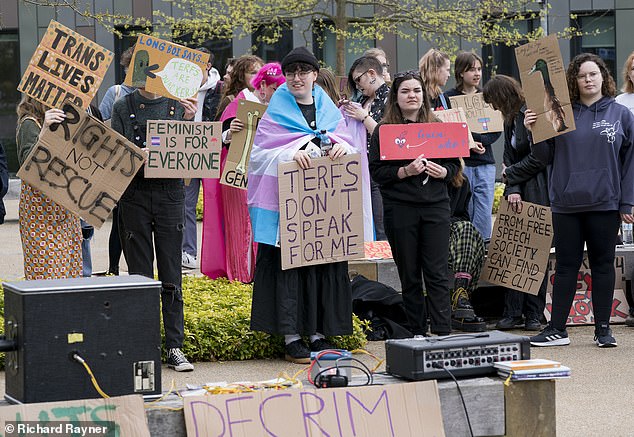[ad_1]
Their faces were twisted with hatred as they jabbed their fingers at me. They waved placards denouncing me as a hate-speaker, a bigot, someone unfit for public life.
This was Oxford University in 2018, where I had been invited to give an after-dinner speech at Queen’s College.
When I arrived, however, I was greeted not by the reasoning intellects you would expect to find at one of the world’s great universities, but by a mob of blue-haired, red-faced woke censors.
They were assembled outside the building where I was due to give my speech, hurling all manner of abuse. I tried to talk to them but they backed off, as if I were a leper.
To them, I was a leper — a political leper. Someone who had committed the cardinal sin of dissenting from their politically correct ideology.

University of York students hold a protest on campus prior to a talk by women’s rights campaigner Julie Bindel (pictured on May 4, 2022)

The 51-year-old Stock has committed the great thought-crime of our times. Like J.K. Rowling, she does not believe it is possible to change sex
Needless to say, the experience made me deeply pessimistic about our educational institutions.
Free speech looked to be on the run.
This evening at the Oxford Union debating society a similar scene will play out — but on a grander scale. The visit of the feminist academic Kathleen Stock to give a speech is expected to be met by up to a thousand LGBTQ protesters and their supporters.
The 51-year-old Stock has committed the great thought-crime of our times. Like J.K. Rowling, she does not believe it is possible to change sex. She does not believe ‘trans women are real women’. For holding these views, Stock has already paid with her job — she felt forced by student protests into quitting as a professor at Sussex Univesity in 2021.
And over the past weeks she has faced concerted efforts to stop her from speaking at the Oxford Union, as the university’s various student bodies have lined up to call for her to be uninvited.
Those efforts having failed, LGBTQ protesters have now set out to disrupt the event. Not only Kathleen Stock is to be intimidated. Anyone who wishes to attend her talk — irrespective of whether they agree with her — will have to run the gauntlet behind the barricades that will protect them from the activists seeking to stifle free speech.
Yet something reassuring happened last week — a glimmer that gives me hope that these campus tyrants, who have long stifled open discussion, may soon be facing their comeuppance.
A brave group of more than 100 Oxford students issued a call-to-arms by writing an open letter to the Daily Telegraph newspaper. They fear that freedom of speech is in peril.
These students are understandably outraged by how Kathleen Stock has been treated by their contemporaries. Oxford University was founded with ‘the key aim of discussing ideas which some may find challenging’, they say.
And then the killer point. ‘There is much to gain from hearing opposing views on important topics,’ claim these young dissenters from the woke ideology.
What a bizarre state of affairs that it is now newsworthy for students to acknowledge that it is good to hear ‘opposing views’.
My heart soared when I saw the letter. To explain why it is so significant, I must illustrate just how corrosive campus censorship has become. That night at Queen’s College in 2018, I was there to talk about — wait for it — freedom of speech! The irony was laughable.
I was making the case for the right of every person to express themselves as they see fit.
And yet this middle-class mob, these searingly intolerant sons and daughters of privilege, were hell-bent on silencing me.
They were terrified of discussion and determined to create a force field to shield themselves from ideas they disliked.

I had been invited to Christ Church college to debate abortion. I was due to make the pro-choice case
The worst part is that the institutions themselves have often capitulated to students’ demands for ‘safe spaces’, free from difficult ideas.
I know this better than anyone because in 2014, in a separate incident, I was actually banned from speaking at Oxford.
Timothy Stanley, of the Daily Telegraph, and I had been invited to Christ Church college to debate abortion. I was due to make the pro-choice case, Stanley the pro-life case.
But it was cancelled. A mob of furious feminist students insisted it was unacceptable for two blokes to talk about abortion and threatened to turn up with ‘instruments’ to disrupt the debate.
Disgracefully, Christ Church caved in. It said there were too many ‘security and welfare issues’ around this meeting, and therefore it could not go ahead.
At the behest of a rabble of narrow-minded students who would rather stew in a soup of their own opinions, I was silenced.
And I am far from alone.
We have witnessed even high-ranking politicians such as former Tory Home Secretary Amber Rudd being disinvited from university talks because some students felt that she was ‘problematic’.
We have seen the Iranian exile and critic of Islamist extremism and its treatment of women, Maryam Namazie, being ‘no-platformed’ at Warwick University on the basis that she is ‘inflammatory’. Even a female critic of religious misogyny is not allowed these days.
Student officials at Sheffield University banned music by the rapper Eminem on the grounds that it is ‘anti-gay’.
At the more ridiculous end, the student union at the University of East Anglia famously banned students from wearing sombreros, because it might offend Mexicans.
And the student union at Manchester University banned clapping in case it caused ‘issues’ for students with sensory problems. Instead it encouraged students to show approval by using ‘jazz hands’ — which to my mind is more offensive for the speaker.
Whether the campus censorship is petty or political, the result is the same: students are encouraged to think of themselves as fragile creatures who must be protected from the slightest offence.
I didn’t finish university and I had to learn my debating skills elsewhere. But I always understood why people were enticed by higher education. Back then, universities offered an opportunity to challenge the opinions of others — and more importantly be challenged in an intellectually demanding environment.
When our views are constantly scrutinised, we are forced to defend them or question our own assumptions.
Without debate, we become thoughtless, lazy and complacent. Now, finally, some students are realising this.
They are taking a stand against their cohort’s chilling, paternalistic worldview.
Oxford students saying openly ‘Let Kathleen Stock speak’ might feel like a landmark. In reality, this declaration is the product of a slow, but powerful, sea-change against the forces of wokery.
In recent years, free-speech societies have been popping up across the country to protect the open debate which, until recently, was a given on campuses. At Edinburgh, Dundee and Bristol, students have established platforms to encourage such debates.
The founder of Bristol’s Free Speech Society, Izzy Posen, says universities must be ‘places for the uncompromising and relentless search for truth’.
Meanwhile, the Free Speech and Secular Society at Manchester University has made a point of inviting speakers banned on other campuses, including feminist Julie Bindel who, like Stock, doesn’t believe in gender self-identification.
And the Free Speech Society at York University works to promote the importance of ‘tolerance, debate and the free exchange of ideas’.
The visit of Kathleen Stock to the Oxford Union this evening is expected to result in trans activists trying to intimidate supporters of free speech and open debate into silence.
But more important is that organisers have refused to yield to this intimidation. So the tide is starting to turn. Increasing numbers of students are sick of being patronised as pathetic wallflowers who must be protected from ‘controversial’ ideas.
They are challenging the stranglehold that the woke have exercised over campus life.
They are demanding their right to hear all ideas, and to decide for themselves which are good, and which are bad.
This is the real counter-cultural revolution — the resurgence of rational, free-minded students against self-appointed censors who have wielded far too much power on campuses in recent years.
It’s one student revolt I can really get behind.
[ad_2]

